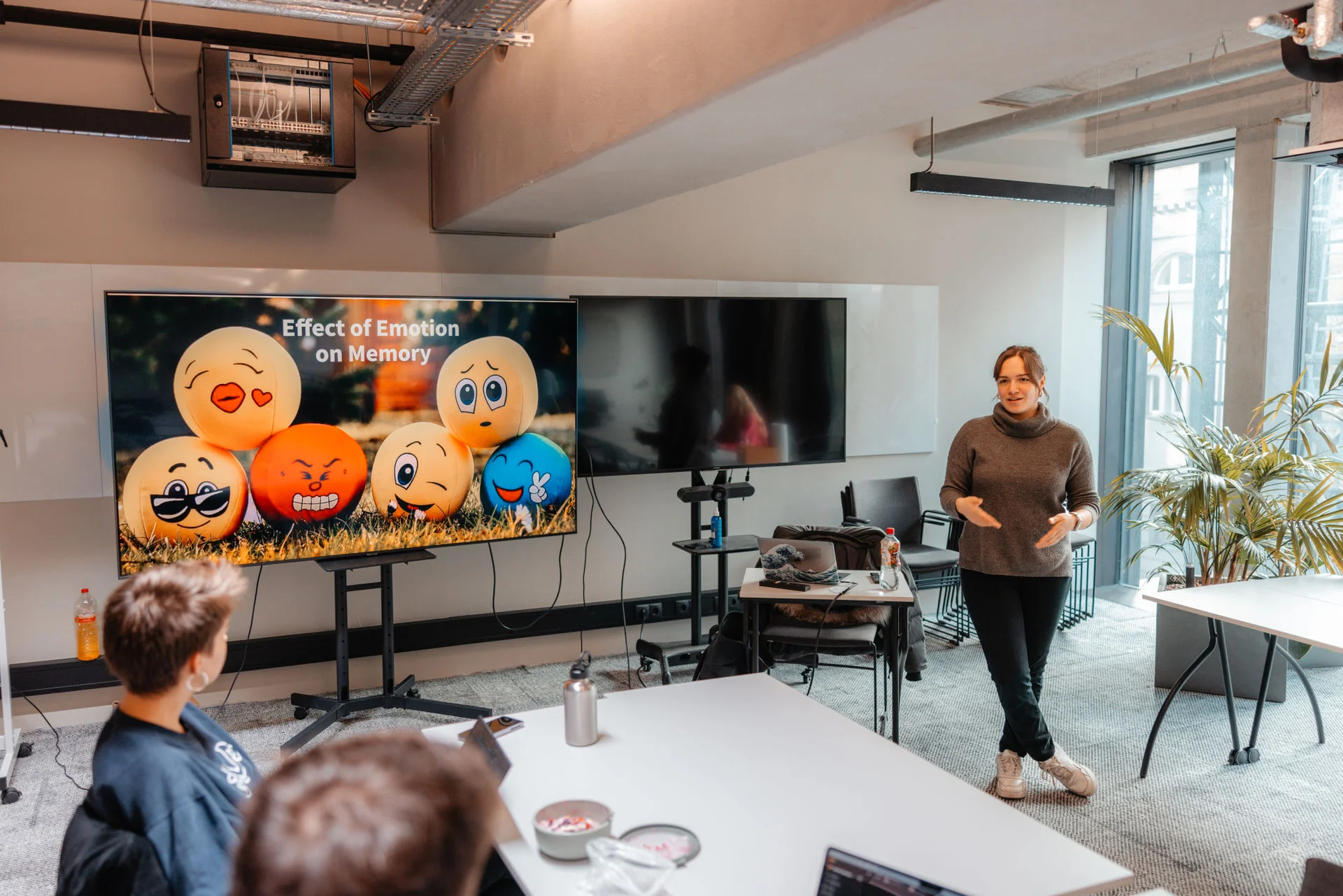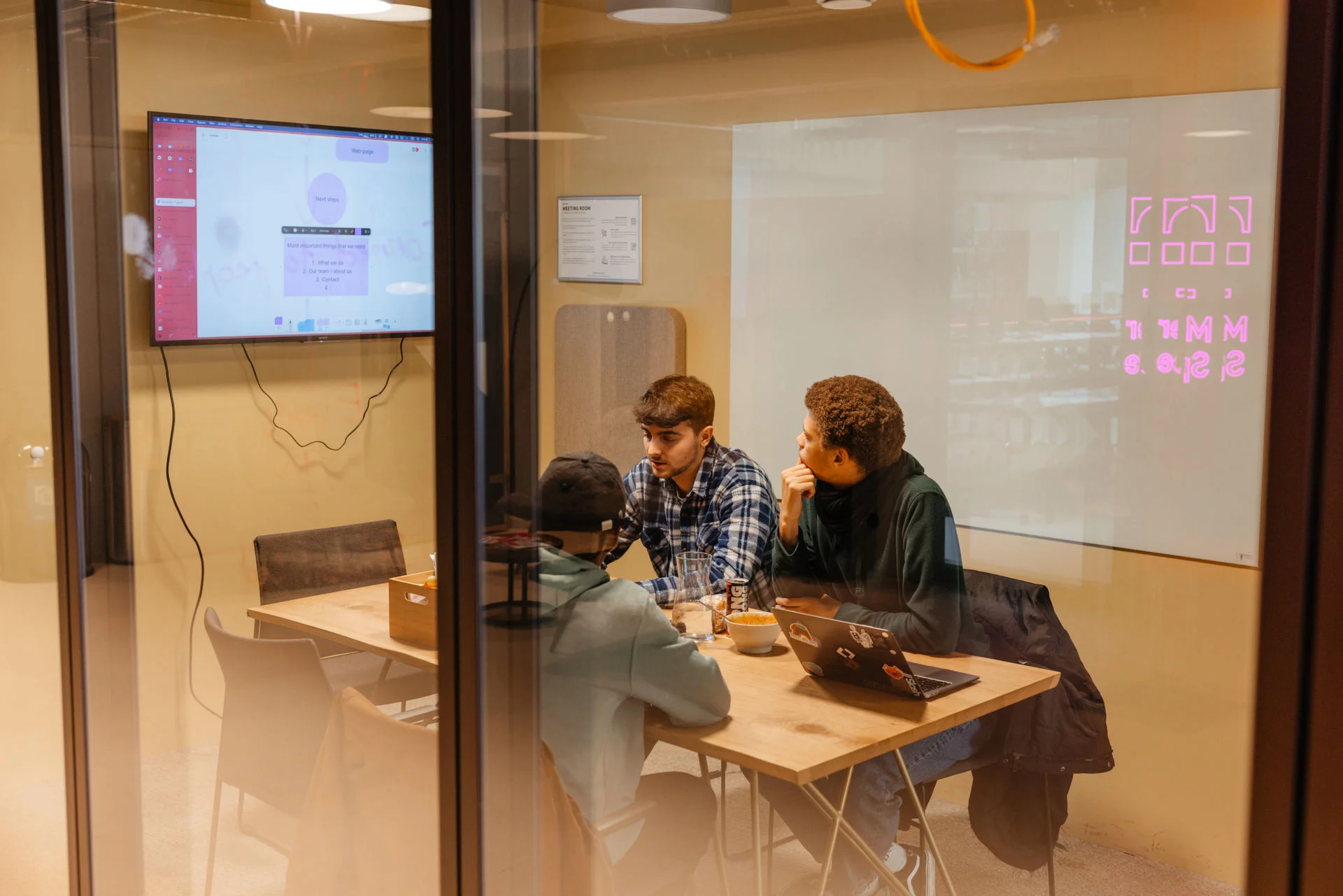Business Management & Entrepreneurship Modules


A Bachelor degree at CODE typically takes three years (6 semesters) and is broken down into three types of semesters: Orientation, Core and Synthesis. The study programs and curricula are designed to accelerate your learning and maximize your curiosity.

Orientation Semester
The first semester for every CODE student, where you get practical experience in all three disciplines, with professor guidance and project-based assignments.
Software is everywhere in today's world − from our homes to outer space, from medicine to digital products, software is everywhere we look and a part of everyday life. Having a basic understanding of what software is, how it can be used, and how to engage with software as a creator and not just a user is a key part of technoliteracy and an essential skill of the 21st century.
In this module, students gain an understanding of the most important aspects of software engineering. Students encounter contemporary best practices of the software development process and how to apply these in practice. Students select and schedule their own learning path based on a set of offerings and reflect on their choices.
Students who successfully complete this module develop a basic understanding of Design and its application in both analog and digital contexts. Students are exposed to (and are required to deploy) a range of introductory methods, tools, and theories related to Design. Students explore topics (for example through design briefs or challenges) in groups or individually and through research, develop creative responses that are contextually appropriate. Students develop their knowledge and experience through engagement in Orientation Semester-specific workshops, peer-to-peer feedback and critique sessions, through learning-by-doing in project-focused work and reflective activities and outputs.
We live in a world of products. Almost everything that is designed and engineered in some way is made available to the world in the form of a product. The product mindset does not need to be only about commercial products, but equally applies to non-profit products and social innovation. Business, product and innovation managers help to define and bring to life digital and physical solutions to real-world needs and problems, while the entrepreneurial mindset ensures the viability of the products and organizations which build them, whether in a highly scalable startup, an established company of any size, or an NGO.
In this module, students gain a broad overview of perspectives and methods in business management and entrepreneurship. Students understand key elements of product discovery, market analysis and product strategy and apply them within guided exercises. Furthermore, students are introduced to the fundamental principles of agile product development, and they know the main aspects of the roles of business, product and innovation managers in organizations.
Project-based learning (PBL) is the core pedagogic approach at CODE University of Applied Sciences in which students are engaged in complex, real-world projects that are linked to their studies and encourage them to develop inquiry and problem-solving abilities.
During this module students are exposed to key principles, methods, tools, and approaches of PBL which they will apply to a project that forms/is the synthesis of learning, outcomes, and outputs from OS_01, 02, 03. This is a practical module and students are expected to demonstrate a body of work that includes experiments, documentation, and reflection on practice throughout. The main objective is to provide students with sufficient background knowledge in Project-based learning that allows them to transition into core semester study.

Core Semesters
This is where you will spend the majority of your time, building projects, joining Learning Units and doing assessments. You decide which modules you want to take when and how to align them with your project work.
Students who study this module learn how to make data-informed decisions in product and business development. Organizations have to make decisions with ever-increasing frequency and complexity. The decision-making process needs to be context-sensitive and grounded in data to increase the chances of achieving desired outcomes. While data should not solely dictate the direction of development, both quantitative and qualitative data points should be taken into account to transcend personal opinions and biases. Operationalized, this means an organization's decision-making culture is data-informed and context-aware through the use of a strong data foundation, defined metrics, performance indicators and hypothesis-driven experimentation.
This module focuses on the value of strategic partnerships and third-party integrations and the process for managing these to achieve success. Third party integrations are becoming essential to attract and retain customers. As users seek ways to avoid using many different applications, they look for services that can address all their needs. At the same time, companies lack the capacity or expertise to implement diverse functionalities independently and instead join forces with third-parties or strategic partners to implement their services and leverage the potential of ecosystems to support growth. Additionally, this module considers the economic, technological, ethical, and legal dimensions of third-party integrations.
This module provides an overview about consumer psychology and consumer behavior. Consumer psychology examines why and how people buy, use, and sell products and services. All consumers are similar in that they have needs and wants, but they differ in their consumption patterns and consumption behaviors. Consumer psychologists try to find the underlying cognitive processes behind consumers’ choices as well as how advertisements, marketing, and external cues can influence consumer behavior.
When developing new products and services, it is crucial to understand how consumers process information (e.g. to develop a convincing and successful homepage/landing page for your product), how habits are formed (e.g. to increase your number of recurring users), how to attract attention to your product and how to ensure that customers remember your brand.
Economics is the science of studying our interactions and exchanges using a complex value system. In this module, students examine questions including: What is an economy? What are the elements? What are the current arguments and positions taken? What are “schools of thought” and why are they relevant for how businesses are built and run? Why are there conflicting perspectives on how value should be understood and exchanged? What are the implications for communities and society? How can economic theory be applied to various business models?
The module is based on the understanding of foundational perspectives in theories of economics, while also focusing on applications in various fields of economic activity.
Students who study this module cover the topics of founding a legal entity, the associated tax requirements and strategies and options for external financing, and ultimately assessing which course of action is most appropriate for any given set of circumstances. Being a founder and entrepreneur is often seen as a paradise that is easily achieved.
This module debunks this myth and helps students understand the real work, in clear steps, that get them through assessing the correct direction to take and follow proven steps that have enabled CODE students to develop successful companies.
The module provides product and innovation managers as well as entrepreneurs who are working or wish to work with data, big data, artificial intelligence and machine learning with a deep foundational knowledge. The need to understand the complexity, ethics and regulatory frameworks to deliver data driven or AI enhanced products is increasing exponentially with many experts predicting that the economic value of AI will be a magnitude larger than the internet that gave rise to the digital product development discipline. This module develops students to have a data-driven approach to creating new digital products.
The module for Entrepreneurial Excellence provides the best practices and theories for running businesses through the first years of growth after the legal founding process. The module explores the crucial elements and strategies commonly used to establish the foundation for businesses, including financial management, marketing, and team building. It provides opportunities to learn from successful entrepreneurs and industry experts, and covers the experiences and insights on what it takes to build a thriving business. This module prepares students for the substantial investment that will be made in growing CODE projects once funded and founded, preparing them for the fight for survival, and providing a space to share challenges, doubts, achievements, and learnings.
Business Management and Entrepreneurship is a broad field of practice that is constantly evolving in new directions. Technological and methodological innovations require managers and entrepreneurs to adapt quickly and explore new best practices on their own. In this module, students define a specialty topic and explore suitable learning resources on their own, with guidance from the BM faculty. Students chart a path toward the application of the knowledge they gain and evaluate the methods they used by reflecting on the experience they have gained. Students create outcomes in the forms of iterations on methods or pathways to product innovations.
Students who study this module learn about communication and stakeholder management within product development. Both are key in any type of product development. From defining a strategy to implementing it with a team, communication with stakeholders, team members, executives, investors, partners, etc. needs to be clear and efficient to drive innovation processes. This also includes leading discussions, negotiations and different difficult conversations to prevent and solve conflicts. Students learn to identify, prioritize and manage different groups of stakeholders based on a clear approach. Ideas have to be conveyed in appealing ways in a variety of presentation and pitch formats to win support within the team and from external stakeholders. This entails self-reflection on one’s own verbal and non-verbal communication style.
Overall, this module helps students to develop a basic understanding of the product discovery process and equips them with practical skills to navigate through the early stages of product development. It provides an overview of the product discovery process based on the Double Diamond to define a problem worth solving, identify user needs, understand the market, generate ideas, and validate prototypes to develop a Minimum Viable Product (MVP). Starting with a clearly defined problem or opportunity, students learn how to design a product with a measurable impact based on hands-on group work activities. As part of the discovery process, students learn how to utilize methods for Customer Discovery, Market Research, Ideation, Prototyping, and the evaluation of product ideas.
Businesses need customers and the ability to generate revenue from them. Marketing is the investment into reaching customers, building brand awareness and loyalty. Sales is the process of monetizing a product or service and ensuring exceptional customer experience.
Marketing and Sales need to work in tandem to unlock the growth potential of a product operation. In this module, students acquire in-depth knowledge about important marketing instruments in the internet/mobile and AI age for B2B and B2C sales processes.
Whether the product serves B2B or B2C markets, effective sales requires an understanding of relationship building and excellence in customer experience over the entire lifecycle of the relationship. Students explore successful techniques and strategies that ensure success at each stage of the lifecycle of the sales relationship: from initial awareness of need, solution exploration, the product choice and 1st moment of truth, closing the deal, product/service experience, post-sales experience, and achieving the positive referral to others. This module covers different ways of building and managing sales funnels from a traditional top down model to product-led growth models and provides techniques to negotiate and close deals.
Agile working cultures are enabling organizations of all types and in all industries to drive successful product development, innovation and digitalization initiatives. In this module, students gain practical experience in agile methodologies of project management. To enable successful application practices, they develop a deep understanding of the principles and values that underlie agile frameworks, such as Kanban and SCRUM. They learn to collaborate using these frameworks within self-organizing teams, collect and prioritize requirements, and manage the flow of work to deliver value to customers and stakeholders.
Successful product development is based on integrating excellence into technology and design and implementing a clear strategy that takes the idea from concept to marketable product. Products have different goals, serving business requirements but also considering their social and ecological impact. Students learn to connect product goals with practical decision-making methods, enabling them to align a team on a focused implementation effort.
This module teaches the essentials of financially sustainable digital businesses: business model design, business planning, financial reporting and controlling. The business model segment focuses on how to construct, test, track, and improve a business model. When founding and building a company, it is not enough to have a great product. Every great product also needs a business model to allow the company to grow and innovate. Even in an early startup phase, it is important to think about business models that are replicable and scalable. Such business models are the key to successful and profitable products. Strategies to achieve sustainable growth based on a process of relationship growth with customers and stakeholders are explored.
The finance and controlling segment focuses on the valuable discipline of team-based business and financial planning. This module looks at the fundamentals of budgeting and planning, and the intersection with corporate strategy. Students acquire critical thinking and analysis skills of the financial statements of the startup and the large enterprise. Techniques for price setting and management are essential levers to achieving profitability. The basics of and tools for bookkeeping and tax reporting are presented in order to ensure compliance with regulatory requirements. The module explores the ethical implications of business models and managing financial resources, how they impact stakeholders, and techniques used to protect against unethical behaviors.
In this module, students learn about the importance of teamwork and collaboration and can practice these skills through their project work experiences. Good teamwork skills are essential in any work environment, and various factors contribute to being a good team member. Students demonstrate the necessary skills for successful and effective collaboration through working with international and interdisciplinary team members. They also gain an understanding of essential principles such as team development, feedback, communication, conflict management, and intercultural issues.
Students learn about effective teamwork and collaboration tools and discuss how they have applied and developed them. These tools include mindsets, team development stages, feedback, communication, conflict management, and intercultural awareness.
To complete this module, students must apply the skills they started to learn during the Orientation Semester to at least one project or in a work experience context.
The term Leadership is omnipresent. But what does it really mean, how do you interpret it, and what's your personal style? This module enables students to experience a very personal journey to find their leadership style.


Choose your own study path
To encourage your curiosity, CODE offers a flexible study path, that is individual to each student. In your core semesters, you can choose modules from each study program to shape your journey based on your specific interests.
Apply to CODE and start your journey now!
Our admission process is designed to find out if CODE is the right place for you - and you are the right person for CODE. This is why our admission process aims to challenge your drive and curiosity.